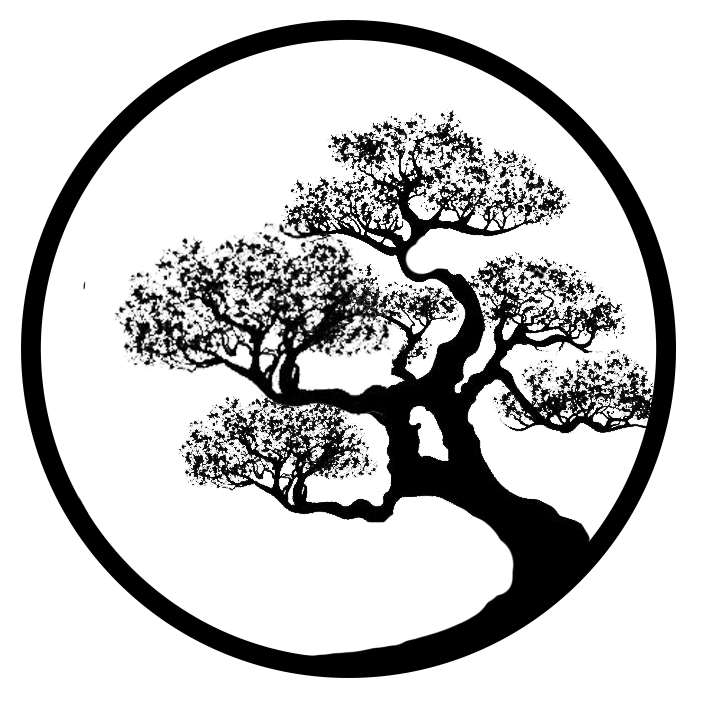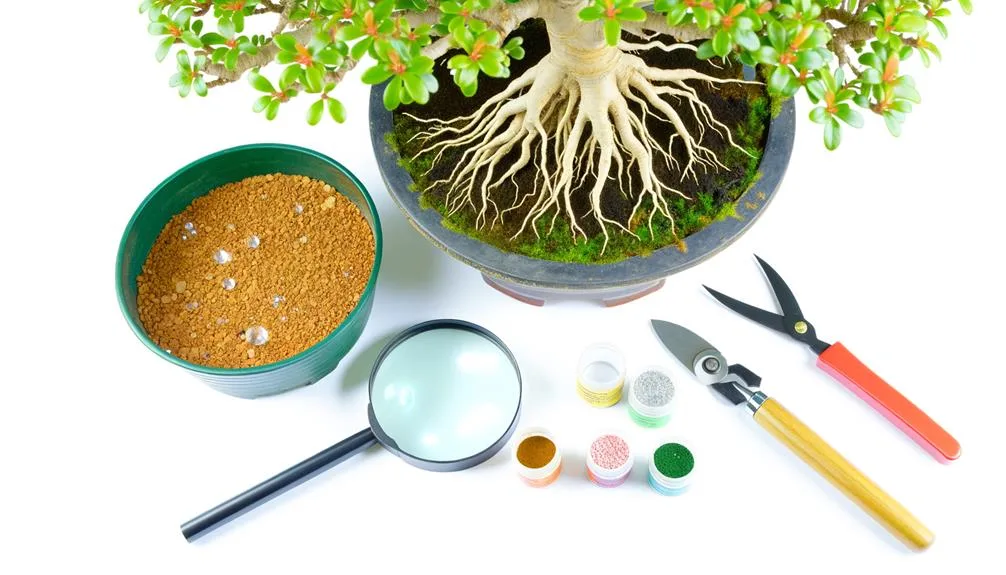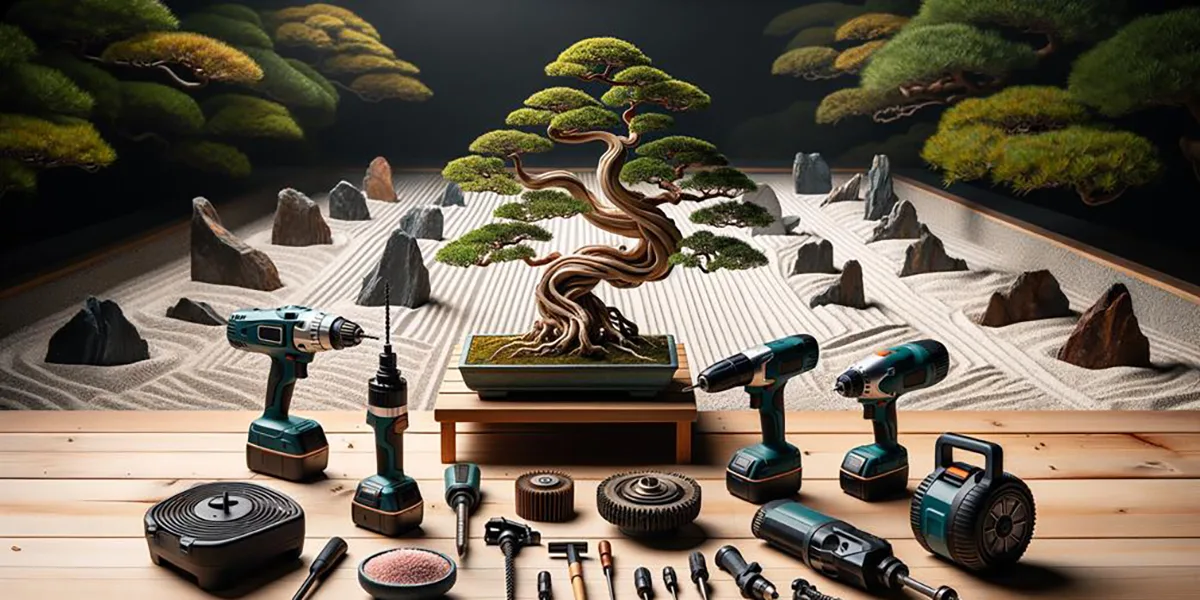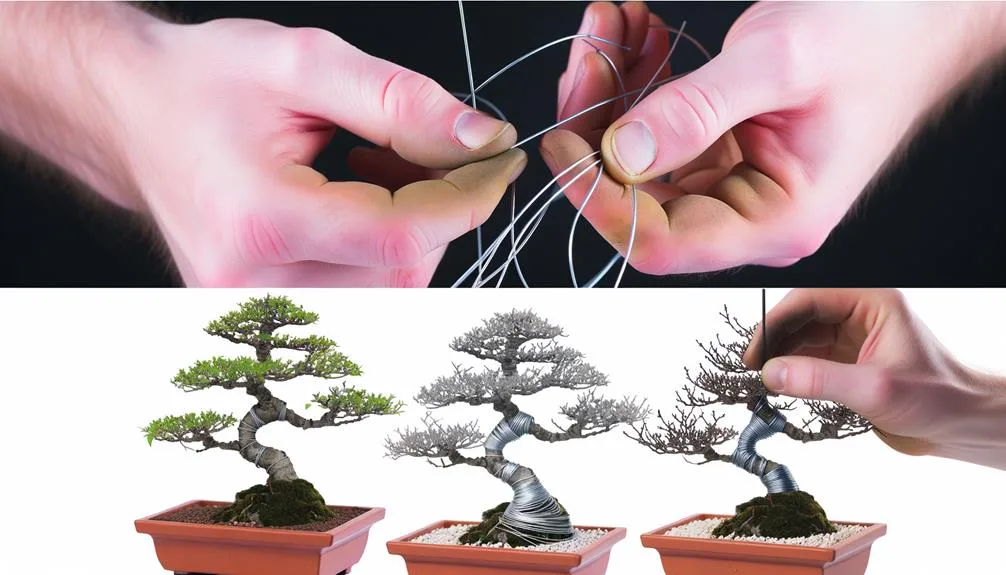Did you know that I’ve found over 90% of problems with my bonsai tree were due to improper nutrition?
Yes, it’s true, my bonsai needs a balanced diet just like I do. It’s not just about water and sunlight. There’s much more involved. I have to ensure it gets the right mix of essential elements and micronutrients.
But don’t worry, it’s not as complicated as it sounds. So, why is nutrition so important for my bonsai and what are these essential elements and micronutrients?
Let’s explore this together.
Key Takeaways
- Proper nutrition is crucial for the health and growth of bonsai trees, with over 90% of bonsai problems being caused by improper nutrition.
- Bonsai trees require primary nutritional elements like nitrogen, phosphorus, potassium, and micronutrients for their balanced diet.
- Organic fertilizers gradually distribute nutrients and improve soil quality, while inorganic fertilizers provide instant availability of major plant nutrients.
- Nutrient deficiencies can be recognized through signs such as yellow leaves or reduced growth, and catching these signs early is crucial for bonsai tree health.
Starting Point on Bonsai Nutrition
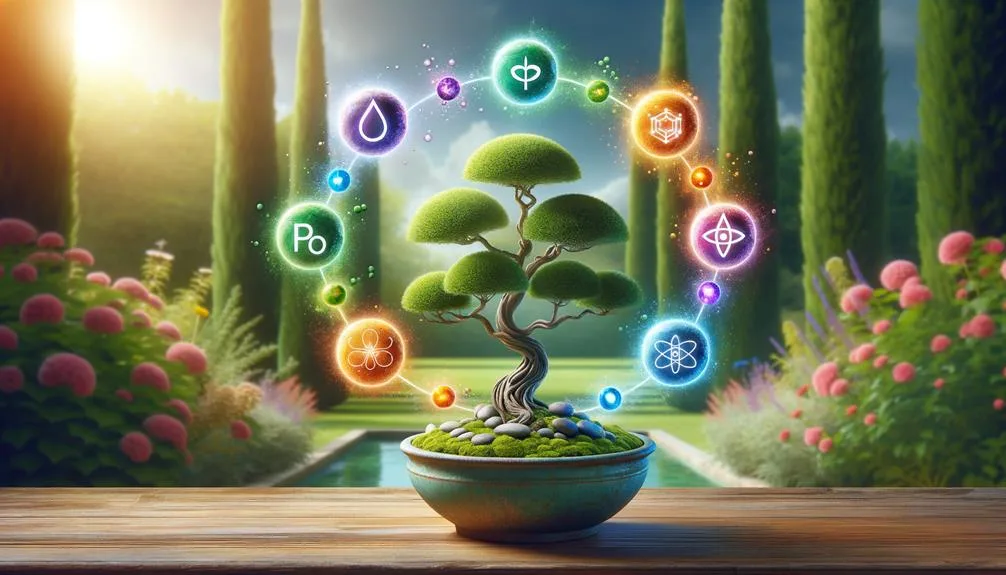
Let’s start your bonsai journey with understanding its nutritional needs.
You’ll learn about different fertilizers and how to choose between organic and inorganic options.
We’ll also help you identify signs of nutrient deficiencies in your bonsai.
Bonsai Nutritional Requirements
To ensure the health and beauty of your bonsai tree, it’s crucial to comprehend the primary nutritional elements it requires: nitrogen, phosphorus, potassium, and a range of micronutrients. These elements are integral to the nutritional needs of a bonsai tree for its healthy growth.
It’s key to remember, when the tree is going through active growth, to regularly use a bonsai-specific fertilizer containing main nutrients like nitrogen to encourage robust growth. Micronutrients such as iron, which contribute to the plant nutrition, shouldn’t be overlooked. These micronutrients are as vital as the primary elements in bonsai tree care. These can be found in specialized fertilizers or supplements.
Organic Vs Inorganic Fertilizers
Having gained knowledge of the core nutrients and micronutrients required by your bonsai, the next crucial step is to evaluate the origin of these nutrients: organic versus inorganic fertilizers.
Deriving from sources akin to compost tea, organic alternatives gradually distribute nutrients, augmenting soil quality and mitigating the possibilities of micronutrient deficiency in bonsai trees. These options enrich your bonsai soil mix, improving the vital elements and micronutrients required.
Contrarily, inorganic fertilizers provide instant availability to major plant nutrients such as nitrogen, phosphorous, and potassium (NPK). These balanced fertilizers are synthetically produced, ensuring exact nutrient proportions. Nevertheless, caution must be exercised during application, as excessive usage can be detrimental to your bonsai.
Being a bonsai admirer, acknowledging these variances aids in selecting the appropriate fertilizer for your tree’s health.
Recognizing Nutrient Deficiencies
Keep a vigilant watch for signs of nutrient deficiencies in your bonsai, as these can act as early warning flags suggesting that your plant may not be receiving the necessary nourishment.
Identifying nutrient deficiencies is vital to bonsai nutrition: vital elements and micronutrients are imperative for the health and growth of your tree. A micronutrient deficiency in bonsai trees may manifest as yellow leaves or reduced growth. These are typical indications of micronutrient deficiencies.
Ho Yoku micronutrient supplements can assist in rectifying a nutrient deficiency which Ho Yoku has pinpointed. They supply the necessary nutrients for your bonsai to flourish, creating a harmonious mix of macro and micronutrients.
Catching these signs at the earliest is crucial for your bonsai’s health.
Primary Factors in Bonsai Nutrition
Bonsai Nutrition primarily concerns itself with the role of macronutrients and micronutrients. Macronutrients like nitrogen, phosphorus, and potassium have a significant impact on root development and overall growth of your bonsai tree.
Micronutrients shouldn’t be overlooked. These chelated micronutrients are necessary for your tree. They’re involved in many physiological processes. A deficit of these might result in micronutrient deficiency in bonsai trees, which can be identified by symptoms like browning leaves or abnormal leaf textures.
Factors to consider include:
- The specific composition of your soil is crucial to bonsai nutrition. All bonsai soils aren’t created equal.
- Consistent application of a quality bonsai tree fertilizer is important. This ensures a steady provision of nutrients.
- Excessive fertilizing can lead to ‘fertilizer burn’, damaging the tree’s roots.
- Supplements high in micronutrients can assist in preventing and addressing deficiencies.
Underlying Nutritional Factors
Understanding the fundamental nutritional factors, it’s significant to comprehend that micronutrients, even though needed in small quantities, are crucial for your bonsai tree’s health and growth. Concentrating on bonsai nutrition: vital elements and micronutrients, these nutrients are necessary for enzyme activation and plant growth.
A lack of micronutrients in Bonsai trees can lead to leaves turning brown or yellow, black scorched edges, and unusual leaf textures. To avoid this, using a fertilizer with 8 Chelated Micronutrients that your tree requires could be beneficial.
Keep these important points in mind:
- Boron, chlorine, cobalt, copper, iron, manganese, molybdenum, and zinc are some of the crucial micronutrients for your bonsai tree.
- Ho Yoku MicroTotal functions as a vitamin supplement, providing these important micronutrients.
- The soil selected for your bonsai tree should be rich in nutrients to promote healthy growth.
- Regular observations for signs of micronutrient deficiencies can help maintain the health of your tree.
Immediate Impact of Nutrients
The immediate impact of nutrients and the significance of micronutrients for the health of your bonsai is our focus in this section.
The proper blend of nutrients can bring about an observable change in your tree’s wellbeing. Here is what occurs when you supply your bonsai with the crucial elements and micronutrients it requires:
- A healthier, more lively look in your bonsai will become noticeable. The leaves will appear lush and green, with no indications of micronutrient deficiency such as browning or yellowing.
- During the growth season, your tree will prosper. It will be more robust, less prone to health issues typically observed in nutrient-starved plants.
- Administering a balanced fertilizer like Ho Yoku MicroTotal every 6-8 weeks guarantees your bonsai acquires the chelated micronutrients it requires.
On the other hand, if bonsai nutrition is overlooked, your tree might exhibit signs of micronutrient deficiency. These symptoms in Bonsai trees include browning or yellowing leaves, which signal a deficiency of key nutrients.
Keep in mind, the health of your bonsai is your responsibility. Nourish it properly, and you’ll be rewarded with a beautiful, flourishing bonsai.
Secondary Nutritional Consequences
Beyond immediate impacts, your bonsai may face secondary nutritional consequences if inadequately nourished. These long-term effects can be as harmful as immediate ones, thus the importance of bonsai nutrition, including essential elements and micronutrients, shouldn’t be underestimated.
Ignoring this can lead to a micronutrient deficiency in bonsai trees. Here are some secondary nutritional consequences that could happen:
- Your bonsai may not reach its full potential.
- Chelated Micronutrients your tree requires may not be effectively absorbed.
- A mere nutrient deficiency can result in a weaker immune system, making your bonsai more prone to diseases.
- Nutrient deficiency, which Ho Yoku 3-3-3 fertilizer can rectify, might lead to faded leaf color.
-
Ho Yoku Products Bonsai Fertilizer – Plant Care Bundle Includes Biogold Pellets, 3-3-3 Fertilizer and Two Fertilizer Cups
- Biogold Triangular Pellets: Stop the frustration of the pellets rolling off the pot with BioGold’s triangle shaped pellets.
- Clean Biogold Bonsai Fertilizer: Save your Bonsai Tree from insects, birds and mold growth.
- Liquid Bonsai Fertilizer: 3-3-3 formulated bonsai food that does not run the risk of fertilizer burn
To prevent these issues, it’s imperative to ensure the soil is sufficiently aerated and rich in trace elements (Micro). These components are crucial for the bonsai to thrive. Regular application of a balanced fertilizer like Ho Yoku 3-3-3 can supply the necessary nutrients.
Opposing Nutritional Perspectives
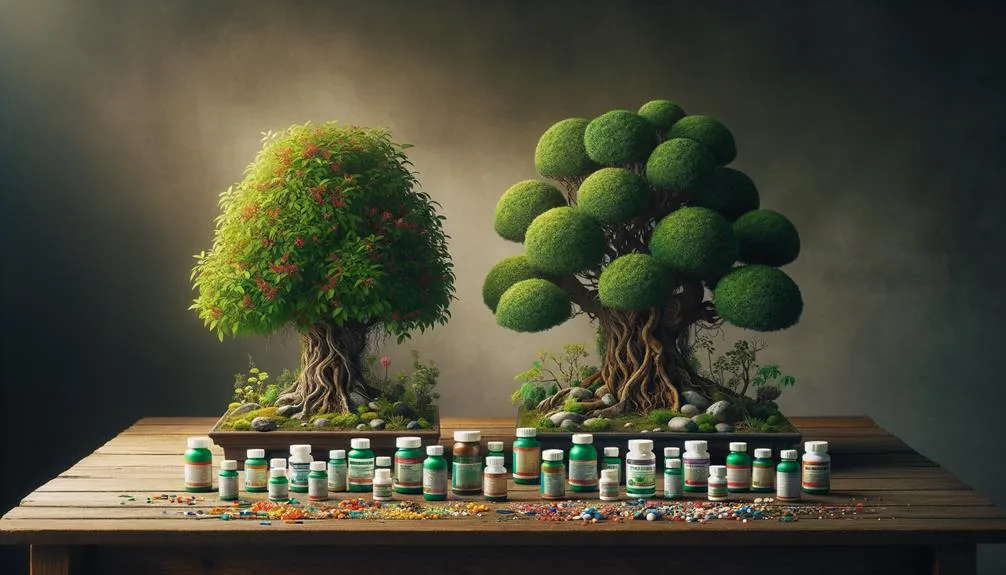
The debate on the best feeding method for your bonsai is split between two main perspectives: the use of organic fertilizers versus inorganic ones. Each approach offers distinctive advantages for the tree’s well-being and development. This forms part of the contrasting viewpoints on bonsai nutrition, which include essential elements and micronutrients.
Organic fertilizers are known for providing slow-release nutrients and enhancing soil structure, while inorganic ones are praised for their ability to deliver quick-release nutrients in precise ratios. However, the focus isn’t only on these vital elements such as nitrogen, phosphorus, and potassium. Your tree also requires a careful balance of micronutrients, which is where the risk of micronutrient deficiency in bonsai trees comes in.
- Ho Yoku MicroTotal is ready to use and supplies the Chelated Micronutrients your tree needs.
- The supplement is administered per gallon of water.
- This product encourages dark green new growth.
- Ho Yoku is acknowledged for its ability to thwart nutrient deficiency.
Balancing Bonsai Nutrient Intake
Now, we’re going to discuss how you can maintain a balance in your bonsai’s nutrient intake. Achieving a balance in bonsai nutrient intake is crucial for its healthy growth. Without the correct combination of necessary elements and micronutrients, your tree may suffer from nutrient deficiency, a situation that Ho Yoku can help to prevent.
When we talk about bonsai nutrition, both necessary elements and micronutrients hold immense importance. Here is a breakdown:
- Nitrogen, phosphorus, and potassium play a significant role in growth and development.
- Chelated Micronutrients required by your tree include boron, chlorine, cobalt, copper, iron, manganese, molybdenum, and zinc.
- Fertilizers work by releasing these nutrients into soil mixes, from where your bonsai absorbs them.
- Ho Yoku MicroTotal works similarly to a vitamin supplement, providing necessary micronutrients.
It is important to identify micronutrient deficiency in Bonsai trees. Signs to look for include browning or yellowing leaves, scorched black edges, abnormal leaf textures, and aborted flower buds.
Make sure to fertilize regularly during the growing season so that your bonsai absorbs nutrients for healthy root growth. This practice will help you maintain a balance that fully supports your bonsai’s health and growth.
Evolution of Bonsai Nutritional Practices”
The progression of Bonsai Nutritional Practices has notably altered over the years, transitioning from conventional methods to a concentrated focus on vital micronutrients. This shift in bonsai nutritional practices indicates a profound comprehension of the bonsai’s complex nutritional requirements.
You now comprehend that a lack of micronutrients in bonsai trees can cause problems like browning. To keep your bonsai lively and robust, it’s important to regularly replenish its nutritional content. The two primary methods to achieve this include:
- Opting for the correct fertilizer: Choose one that’s abundant in both macro and micronutrients. Apply it every two to four weeks during the growth period.
- Making sure your bonsai receives ample sunlight: Sunlight aids in nutrient absorption.
Keep in mind that proper bonsai nourishment comprises vital elements and micronutrients. Paying attention to these is a critical step towards preserving your bonsai’s overall health.
Lastly, be sure to gently distribute the fertilizer over the soil without touching the trunk and roots. In this way, you’re feeding your bonsai in a way that resembles how it would collect nutrients in its natural habitat.
Final Thoughts
Upon digesting the fundamentals of bonsai nutritional practices, we should pause and consider the pivotal role of accurate fertilization and the consideration of crucial nutrients in preserving the health and liveliness of your bonsai trees.
Selection of the appropriate fertilizer, be it organic or inorganic, is crucial. One must adapt the fertilization to cater to the specific needs of each bonsai. Lesser quantities of natural resources can be used effectively. Micronutrients must not be overlooked. They are critical, but often neglected. A micronutrient deficiency in bonsai trees can lead to weak, sickly trees.
Here is a table to exemplify:
| Key Factors | Actions | Results |
|---|---|---|
| Right balance | Adjust fertilization | Healthier Bonsai |
| Unique requirements | Smaller amounts from natural sources | Balanced Nutrition |
| Micronutrient deficiency | Use Ho Yoku MicroTotal as vitamin supplements | Improved tree health |
To conclude our discourse on bonsai nutrition: crucial elements and micronutrients, we underscore the significance of regularity. Keep a close watch on your trees for any indications of nutrient deficiency which Ho Yoku can assist in preventing and treating.
Frequently Asked Questions
What Nutrients Do Bonsai Trees Need?
You’re asking about bonsai tree nutrition. They need macronutrients like nitrogen, phosphorus, and potassium, along with micronutrients such as boron, iron, and zinc. Regular balanced fertilization helps keep your bonsai healthy and thriving.
What Are the Elements of a Bonsai Tree?
You’re asking about bonsai elements. These miniature trees need macronutrients like nitrogen, phosphorus, potassium, and micronutrients such as iron, manganese, and zinc for healthy growth and to prevent leaf discoloration.
What Nutrients Are in a Bonsai Kit?
In your bonsai kit, you’ll find nutrients like nitrogen, phosphorus, and potassium, essential for growth. It also includes micronutrients like iron, manganese, and zinc, vital for your bonsai tree’s overall health and vibrancy.
What Are the Essential Characteristic of a Bonsai Plant?
You’re looking at unique characteristics of bonsai plants. They’re miniature trees grown in containers, can take on various styles, and need specific care including regular fertilization and balanced nutrition for their growth and development.
A product like Ho Yoku MicroTotal can help ensure your bonsai gets all the nutrients it needs. Keep your bonsai’s nutrition balanced and watch it thrive!
